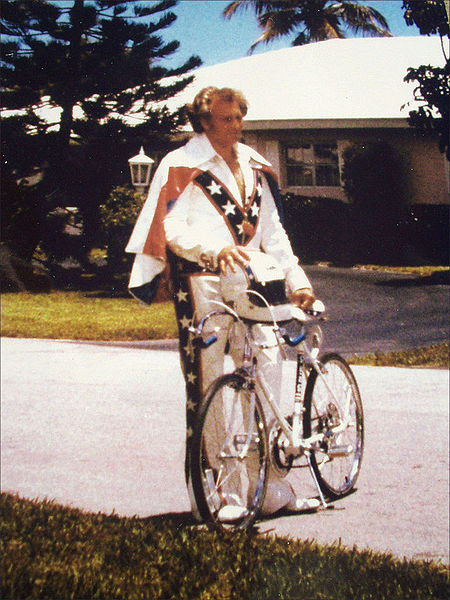Sure, it’s there. But must one rocket the St. Lawrence?

This is daredevil Evel Knievel photographed in front of his house in Ft. Lauderdale, Florida, circa 197?. Image by Bill Wolf, Creative Commons
There’s no shortage of daredevils in the world.
The well-known Evel Knievel actually survived his stunts long enough to die of disease in 2007, though not for lack of trying, as summarized by the New York Times:
Performing stunts hundreds of times, Mr. Knievel repeatedly shattered bones as well as his bikes. When he was forced to retire in 1980, he told reporters that he was “nothing but scar tissue and surgical steel.”
In 1974 Knievel tried (and failed) to jump Idaho’s Snake River Canyon on a rocket-powered motorcycle.
In that same time frame, Stuntman Ken Powers tried to jump the St. Lawrence in a rocket-powered car (a Lincoln Continental) in 1976.
One might think all that belonged to the crazy 70s, but no. According to this recent article from the CBC,
A California stuntman is hoping to become the first person ever to soar across the St. Lawrence River in a steam-powered rocket.
“Mad Mike” Hughes says he’s planning the high-stakes jump in May 2015 in the town of Morrisburg, even if the township of South Dundas might still have a few reservations
CBC reports that Huges is confident of success, assuming the project actually comes together. You can check out his professional website here.
Unfamiliar with the 1976 St. Lawrence River attempt, I poked around and found this short archival footage, if “archival” is the right word for events that took place while I was in high school.
This jump shows Ken Powers behind the wheel.
Canada’s National Film Board has a 102-minute documentary “The Devil at Your Heels” on that project, viewable online. (Apparently, the jump was actually the brainchild of Ken Carter, AKA “the mad Canadian” but Ken Powers was substituted for the actual jump.)
And what to make of it all? I’m not especially interested in motorcycles, cars or daredevilry. So I’m far from the best person to ask. A small part of me admires the drive that goes into taking on something really difficult and working through the technical issues. But my main response is “wouldn’t it be better to apply that same energy toward something less dangerous and more useful?”
That goes for rocket vehicles that end up in pieces that pollute the river and for lives lost riding big surf at places like Maverick’s.
How about you? Do you find the big attempts thrilling? Foolish? Or something in between?
Tags: canada, Ken Carter, Ken Powers, St. Lawrence River, stunts








A child when throwing a tantrum eventually stops if ignored. This kind of activity would probably cease if people would ignore them.
Some challenges like space flight, airplane flight need human control(so far) but to do it just for the money it should not be encouraged.
Very few stunt people or extreme athletes are in it for the money. Mainly because there isn’t much money to be made doing dangerous things. Film makers do a great job making people look glamorous.
It’s easy to sit back and say that these people who risk (and sometimes lose) their lives are immature, foolish, reckless, and any number of negative attributes that folks come up with. But the fact remains that the part of them that drives these risky endeavors is an essential part of our humanity. It’s the part of us that looks to the horizon and wonders what’s on the other side. It’s the part that looks up at a big silver disk in the sky and finds a way to go stand on it (and because we’re Americans – drive a car around on it). It’s the part that desires to travel away from home and learn about different cultures. It’s the part that finishes marathons and triathlons. It’s the part that wins gold medals. It’s the part that discovers. It’s the part in all of us that meets challenges and overcomes failures.
I think that learning to take risks is essential for truly experiencing life.